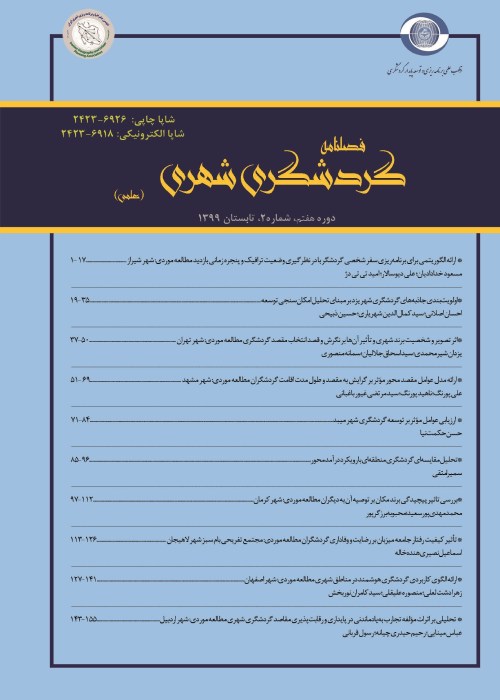The Relationship Between Cultural Intelligence and the Perceived Value of Sustainable Tourism, Case Study: City of Yazd
Extended Abstract
Cultural intelligence defines the ability of an individual to succeed in diverse tasks and cultural settings (institutional, ethnic, national, and international). In this regard, this factor is considered an obstacle to the prevention of cultural contradictions. This study investigates the relationship of cultural intelligence with the perceived value of sustainable tourism in foreign tourists entering Yazd.
The present study is descriptive- correlation concerning the purpose, and according to the data collection method. The study population consisted of all foreign tourists coming to Yazd in April and November 2018 that 260 people were selected as a sample (138 males and 122 females) using the non-probabilistic sampling method. Two questionnaires of cultural intelligence and the perceived value of sustainable tourism have been used to collect data. Cultural intelligence questionnaire consists of 11 items and cognitive, metacognitive, motivational, and behavioural subscales; and perceived value of sustainable tourism questionnaire consists of 19 items and performance, emotional, and epistemic subscales which both questionnaires are graded with a 5-point Likert scale from strongly disagree (1) to strongly agree (5). The total number of questionnaires distributed in this study was 270, of which 260 were usable after the questionnaires were collected and reviewed by the researchers. In order to measure reliability, a prototype consisted of 30 pre-test questionnaires, and then using the data obtained from the questionnaire, the reliability coefficient was calculated by Cronbach's alpha test, which for the variables (0.858) for cultural intelligence and (0.873) was obtained for the perceived value of sustainable tourism. These numbers indicate that the questionnaires are reliable and, in other words, have the necessary reliability.
The findings indicate that cognitive cultural intelligence on the perceived functional value of sustainable tourism (γ 11= 0.81, t= 6.19, p< 0.05); cognitive cultural intelligence on the perceived emotional value of sustainable tourism (γ 12= 0.95, t= 6.24, p< 0.05); and cognitive cultural intelligence on the perceived epistemic value of sustainable tourism (γ 13= 0.70, t= 6.39, p< 0.05) have a positive and significant effect. This finding means that cultural cognitive intelligence has a greater effect on perceived emotional value than perceived functional and epistemic value, and can affect their perceived value, which can affect the development of sustainable tourism. Metacognitive cultural intelligence on the perceived functional value of sustainable tourism (γ 11= 0.78, t= 6.35, p< 0.05); metacognitive cultural intelligence on the perceived emotional value of sustainable tourism (γ 12= 0.87, t= 6.12, p< 0.05); and cultural metacognitive intelligence on the perceived epistemic value of sustainable tourism (γ 13= 0.70, t= 6.39, p< 0.05), have a positive and significant effect. This finding means that metacognitive cultural intelligence has a greater effect on perceived emotional value than perceived functional and epistemic value. The metacognitive intelligence of tourists from the visited area can affect their perceived value, which can affect the development of sustainable tourism. Motivational cultural intelligence on the perceived functional value of sustainable tourism (γ 11= 0.89, t= 7.21, p< 0.05); motivational cultural intelligence on the perceived emotional value of sustainable tourism (γ 12= 0.81, t =5.85, p< 0.05); and motivational cultural intelligence on the perceived epistemic value of sustainable tourism (γ 13= 0.66, t= 6.90, p< 0.05) have a positive and significant effect. This finding means that motivational cultural intelligence has a greater effect on perceived emotional value than perceived functional and epistemic value and can affect their perceived value, which can affect the development of sustainable tourism. Behavioural cultural intelligence on the perceived functional value of sustainable tourism (γ 11= 0.95, t= 7.28, p< 0.05); behavioural cultural intelligence on the perceived emotional value of sustainable tourism (γ 12= 0.81, t= 6.02, p< 0.05); and behavioural cultural intelligence on the perceived epistemic value of sustainable tourism (γ 13= 0.71, t= 6/83, p< 0.05) have a positive and significant effect. This finding means that behavioural cultural intelligence has a greater effect on perceived emotional value than perceived functional and epistemic value and can affect their perceived value, which can affect the development of sustainable tourism. The results of the sub-findings also show that the highest level of cultural intelligence belongs to American tourists (M= 3.88), and the lowest level of cultural intelligence belongs to Asian tourists (M= 3.49).
Findings showed that motivational and behavioural metacognitive intelligence directly and significantly affect the perceived value of cognitive and emotional function. Also, their effect on the emotional dimension of perceived value is greater than the functional and epistemological dimensions. The sub-findings of the study also showed that among the classification of tourists in the study sample (European, Asian, American, and Australian Oceanic), American tourists have the highest cultural intelligence and Asian tourists have the lowest level of cultural intelligence. What results from the study of the hypotheses is that familiarity with the culture, customs, taboos and political, and economic rules of the destination country. And even the origin of other tourists, has facilitated communication with other tourists and residents, and subsequently, the pleasure of interaction, socialization in a foreign culture and satisfaction with this, according to the results of the present study, is directly related to the emotional dimension of perceived value, which ultimately has a positive effect on tourism destination and finally, intercultural communication between the host community and tourists makes a satisfying trip for tourists. In general, the study of the effect of variables such as cultural intelligence in all its dimensions on the perceived value variable and increase the satisfaction of foreign tourists and confirmation of this direct and significant effect by statistical results, is a practical and new finding, which can be very effective in the development of peaceful and sustainable tourism in Iran with foreign countries and reduce the context of cultural conflicts.
- حق عضویت دریافتی صرف حمایت از نشریات عضو و نگهداری، تکمیل و توسعه مگیران میشود.
- پرداخت حق اشتراک و دانلود مقالات اجازه بازنشر آن در سایر رسانههای چاپی و دیجیتال را به کاربر نمیدهد.




